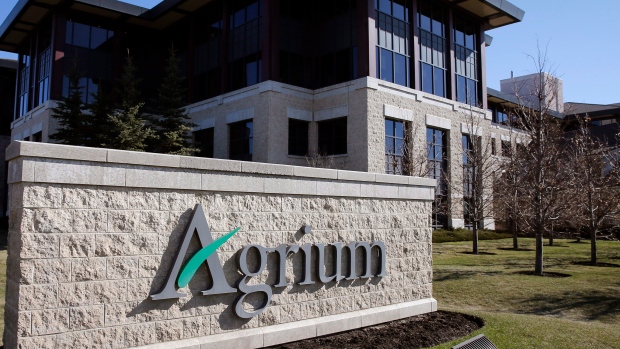Sep 7, 2017
Regulatory hurdles delay PotashCorp-Agrium merger
The Canadian Press

CALGARY -- The friendly merger of PotashCorp. (POT.TO) and Agrium Inc. (AGU.TO) is now expected to close several months later than the previous target date due to concerns raised by regulatory bodies in four countries.
The two Canadian fertilizer producers say they have made progress on the approval process in all jurisdictions, but the deal likely won't close until the end of the year, rather than midyear as originally expected.
When the deal was announced last September, it was estimated the combined company would have an enterprise value of US$36 billion by joining PotashCorp's extensive mining operations with Agrium's mining and global retail network.
The scale of the combined company has led authorities in China and India to ask PotashCorp to sell off some of its investments, which include minority stakes in Sinofert -- China's largest potash producer -- as well as in Israel Chemicals Limited, Chile-based SQM, and Jordan-based Arab Potash Company.
"It's a pretty complex process overall, and it is in multiple jurisdictions, so there's just a lot of back and forth between the different agencies," said PotashCorp spokesman Bill Cooper on the delay.
Cooper said details are still being worked out, but approval from China and India is important since they are such a significant customer base.
The two countries account for almost half of global nitrogen consumption and more than 40 per cent of phosphate use, while Asia as a whole takes up 48 per cent of potash production.
The Canadian Competition Bureau and U.S. Federal Trade Commission have also raised concerns about the potential concentration of suppliers, especially in the superphosphoric acid and nitric acid markets.
Agrium spokesman Richard Downey said U.S. authorities may require the company to sell a small nitric facility in Ohio, as well as its sizable Conda phosphate plant in Idaho to resolve concerns.
"There was a small enough number of other suppliers in the market that it caused economist pause," said Downey.
Scotiabank analyst Ben Isaacson said in a note that the potential asset sales shouldn't impact the $500 million of proposed synergies with the combined company, while he's advocated for some PotashCorp investment sales in the past.
"It's comforting to see that regulator issues aren't a big deal (to us, at least), and -- in the case of the equity stake sale -- actually accelerate what we've wanted all along," he said.
Agrium and PotashCorp already have approvals from regulators in Russia and Brazil, which represent other major markets for their products.
The combined company, to be named Nutrien, will have its official head office in Saskatoon while keeping a corporate office in Agrium's home city of Calgary.



